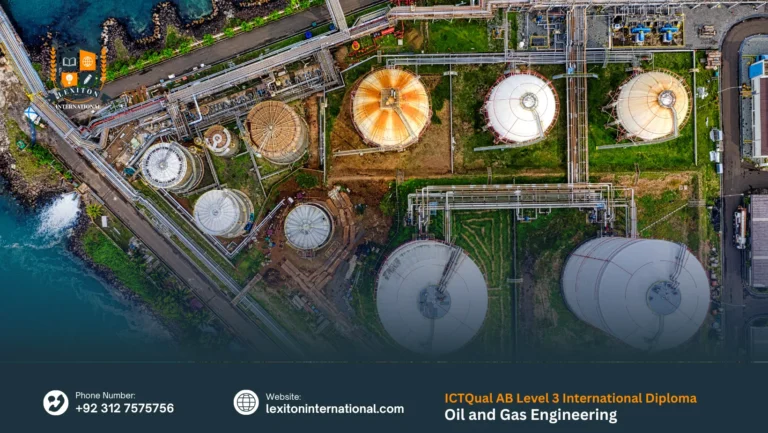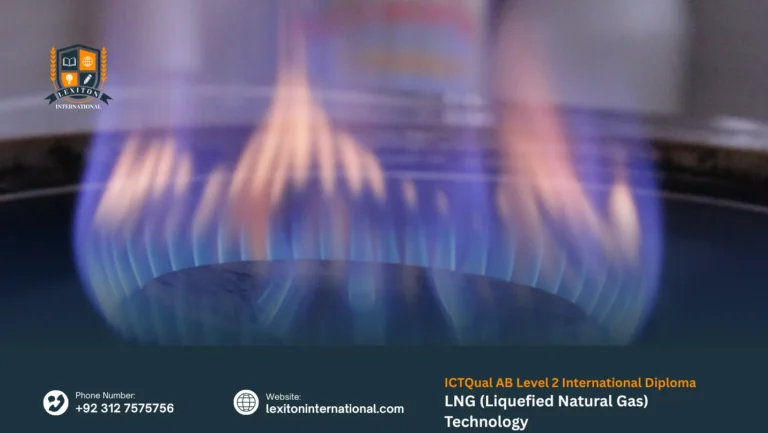The ICTQual AB Level 6 Diploma in Mechanical Engineering (360 Credits – Three Years) is a prestigious, internationally recognised qualification designed to prepare learners for advanced roles in the dynamic field of mechanical engineering. This comprehensive programme provides an in-depth understanding of mechanical systems, engineering design, thermodynamics, manufacturing processes, and applied mathematics, equipping learners with the technical expertise and analytical skills required to excel in modern engineering environments.
Throughout this three-year mechanical engineering diploma, students gain both theoretical knowledge and hands-on experience in engineering design, maintenance, and innovation. The course structure focuses on real-world applications, ensuring graduates can confidently contribute to industries such as aerospace, automotive, energy, construction, and advanced manufacturing.
The ICTQual AB Level 6 Diploma stands out for its strong emphasis on practical learning, project-based assessments, and global relevance. Learners will develop advanced problem-solving and leadership skills while mastering essential tools and technologies used in professional engineering practice. This qualification is ideal for individuals aiming to advance their technical careers or pursue higher education in engineering and technology fields.
By completing this Level 6 Diploma in Mechanical Engineering, graduates demonstrate the competence, innovation, and professionalism expected by employers worldwide. The course opens pathways to senior technical roles, engineering consultancy, or further study at the bachelor’s or master’s level, making it a perfect choice for ambitious learners seeking long-term career growth in mechanical engineering.
To ensure learners are well-prepared to meet the academic and technical demands of this advanced qualification, applicants for the ICTQual AB Level 6 Diploma in Mechanical Engineering must meet the following entry requirements:
- Age Requirement: Applicants must be 18 years or older at the time of enrolment.
- Educational Background: A Level 5 Diploma in Mechanical Engineering or an equivalent qualification in a related field is required.
- Alternative Education: Candidates with a relevant HND or foundation degree in engineering may also apply.
- Work Experience: Learners with 2–3 years of relevant industry experience may be accepted based on their professional background.
- Technical Knowledge: Applicants should have a basic understanding of mechanical systems, design, and industrial processes.
- English Language Proficiency: Non-native speakers must have an IELTS score of 5.5, CEFR Level B2, or equivalent English qualification.
- Previous English Study: Evidence of prior education or work experience in English can also meet the language requirement.
- Mathematical Skills: Learners should possess basic mathematical and analytical skills to manage technical coursework.
- Computer Literacy: A fundamental understanding of computer applications is recommended for engineering software use.
Mandatory Units
This qualification, the ICTQual AB Level 6 Diploma in Mechanical Engineering 360 Credits – Three Years, consists of 36 mandatory units.
Year 1: Foundation and Core Engineering Principles
Year 2: Advanced Engineering Concepts and Applications
Year 3: Specialization and Practical Application
Learning Outcomes for the Level 6 Diploma in Mechanical Engineering 360 Credits – Three Years:
Year 1: Foundation and Core Engineering Principles
- Mathematics for Engineering
- Develop proficiency in fundamental mathematical techniques for solving engineering problems.
- Apply calculus, algebra, and trigonometry in engineering contexts.
- Engineering Principles
- Understand and apply core engineering concepts, including forces, motion, and energy.
- Develop a solid foundation in engineering mechanics and systems.
- Materials Science and Engineering
- Gain an understanding of the properties and behavior of materials used in mechanical engineering.
- Analyze material selection and performance in engineering applications.
- Engineering Drawing and CAD
- Learn to create and interpret engineering drawings.
- Develop skills in Computer-Aided Design (CAD) for mechanical system modeling.
- Statics and Dynamics
- Apply the principles of static and dynamic analysis to engineering problems.
- Solve for forces and motion in mechanical systems.
- Introduction to Thermodynamics
- Understand the basic laws of thermodynamics and their applications in engineering systems.
- Analyze energy transfer and transformation in mechanical systems.
- Manufacturing Processes
- Learn key manufacturing techniques and their application in the production of mechanical components.
- Understand processes such as casting, machining, and welding.
- Fluid Mechanics
- Gain an understanding of fluid properties and fluid flow.
- Apply principles of fluid mechanics to practical engineering problems.
- Electrical and Electronic Systems for Engineers
- Develop an understanding of basic electrical circuits and components.
- Learn how electrical systems are integrated into mechanical engineering applications.
- Engineering Mathematics for Design
- Apply mathematical methods to solve design challenges in mechanical engineering.
- Use advanced mathematics to model and analyze mechanical systems.
- Mechanical Design Fundamentals
- Understand key principles in mechanical design, including material selection and stress analysis.
- Develop skills in designing components and systems for mechanical applications.
- Engineering Project Management
- Learn basic project management skills, including planning, risk management, and resource allocation.
- Understand how to manage engineering projects efficiently.
Year 2: Advanced Engineering Concepts and Applications
- Advanced Thermodynamics
- Deepen your understanding of thermodynamic cycles, efficiency, and energy systems.
- Apply advanced thermodynamics in the analysis and design of engineering systems.
- Strength of Materials
- Analyze the strength and deformation of materials under different loading conditions.
- Apply concepts such as stress, strain, and material failure to real-world engineering problems.
- Heat Transfer and Fluid Dynamics
- Understand the mechanisms of heat transfer and fluid flow in mechanical systems.
- Apply these principles to solve complex engineering problems.
- Advanced Manufacturing Techniques
- Learn advanced manufacturing methods, such as CNC machining, additive manufacturing, and robotics.
- Understand the advantages and limitations of these techniques in industry.
- Mechanical Vibrations and Acoustics
- Analyze mechanical vibrations and resonance in engineering systems.
- Apply principles of acoustics to control noise and vibration in mechanical designs.
- Engineering Dynamics and Control
- Understand the behavior of dynamic systems and apply control theory to stabilize mechanical systems.
- Model and control mechanical systems to optimize performance.
- Design and Analysis of Machine Elements
- Design and analyze machine elements such as gears, shafts, and bearings.
- Understand the principles that govern their operation and performance.
- Control Systems for Mechanical Engineering
- Apply control theory to mechanical systems, including feedback control and system stability.
- Design control systems for efficient mechanical operations.
- Engineering Materials and Failure Analysis
- Investigate material failure modes, including fatigue, fracture, and corrosion.
- Apply failure analysis techniques to improve mechanical system reliability.
- Computer-Aided Engineering (CAE)
- Develop skills in using CAE tools for simulation and design validation.
- Apply Finite Element Analysis (FEA) and Computational Fluid Dynamics (CFD) in mechanical design.
- Mechanical System Design
- Design and optimize mechanical systems considering factors such as performance, safety, and cost.
- Solve engineering challenges in system-level design.
- Project Planning and Cost Estimation
- Learn techniques for estimating costs and planning engineering projects.
- Develop the ability to manage project timelines, budgets, and resources effectively.
Year 3: Specialization and Practical Application
- Advanced Mechanical System Design
- Apply advanced design techniques to create complex mechanical systems.
- Incorporate optimization methods to improve system performance and efficiency.
- Energy Systems and Sustainability
- Study renewable energy systems and sustainable design practices in mechanical engineering.
- Design energy-efficient systems that minimize environmental impact.
- Advanced CAD and 3D Modeling
- Master advanced CAD software for 3D modeling and simulation of mechanical systems.
- Develop detailed models and prototypes of engineering designs.
- Finite Element Analysis (FEA) for Mechanical Engineers
- Use FEA techniques to analyze and optimize mechanical structures.
- Solve complex engineering problems involving stress, strain, and deformation.
- Advanced Manufacturing and Robotics
- Learn advanced manufacturing processes and the integration of robotics in production systems.
- Apply automation to optimize manufacturing operations.
- Mechatronics and Automation
- Study the integration of mechanical systems, electronics, and control systems to create automated systems.
- Design mechatronic systems for industrial applications.
- Engineering Research Methodology
- Develop research skills for investigating engineering problems and solutions.
- Learn how to conduct experiments, analyze data, and present findings.
- Industrial Engineering and Process Optimization
- Apply industrial engineering principles to optimize manufacturing processes.
- Analyze workflows and processes to improve efficiency and reduce costs.
- Design for Manufacturability
- Learn how to design mechanical systems with manufacturability in mind.
- Optimize designs for ease of production and cost-effectiveness.
- Professional Practice in Mechanical Engineering
- Understand the professional and ethical responsibilities of a mechanical engineer.
- Learn how to navigate industry standards, regulations, and communication in the workplace.
- Engineering Innovation and Entrepreneurship
- Explore opportunities for innovation and entrepreneurship within the engineering sector.
- Develop skills to bring new engineering solutions and products to market.
- Capstone Project/Thesis
- Apply knowledge from the entire program to complete a comprehensive engineering project or research thesis.
- Demonstrate the ability to solve real-world engineering problems and present findings professionally.
This diploma is designed for ambitious learners and professionals aiming to advance their expertise and career in mechanical engineering. Below are the key learner categories who will benefit most from this programme:
Aspiring Engineers
- Individuals who want to build a strong foundation in mechanical engineering principles and practices.
- Learners aiming to gain hands-on experience in design, analysis, and maintenance of mechanical systems.
- Those passionate about innovation, technology, and problem-solving in real-world engineering applications.
- Candidates seeking a structured pathway to becoming professional engineers.
- Students who wish to develop technical and analytical skills required in diverse engineering industries.
- Individuals looking to enhance their employability in the global job market.
- Learners motivated to apply scientific and mathematical concepts to practical engineering challenges.
- Those aspiring to contribute to projects in energy, manufacturing, or construction sectors.
Engineering Graduates
- Holders of a Level 5 or equivalent diploma seeking to progress to an advanced level of engineering education.
- Students aiming to upgrade their technical knowledge and specialisation in mechanical systems.
- Learners preparing for bachelor’s degree entry or professional certification pathways.
- Graduates seeking to deepen understanding of advanced design, thermodynamics, and fluid mechanics.
- Those looking to gain international recognition through an accredited qualification.
- Candidates desiring to enhance their research, project management, and innovation skills.
- Learners wanting to connect theoretical learning with industrial applications.
- Graduates who wish to stand out in competitive engineering roles through specialised training.
Working Professionals
- Employees in engineering, manufacturing, and maintenance sectors wanting to upskill for career advancement.
- Technicians and supervisors aiming to transition into higher-level engineering or managerial positions.
- Professionals wishing to strengthen their technical expertise in mechanical design and production systems.
- Individuals seeking a globally recognised qualification to support international career growth.
- Workers who want to refresh their technical knowledge with modern industry practices.
- Experienced engineers aiming to develop leadership and project coordination abilities.
- Professionals looking for flexible study options that complement their work schedules.
- Learners motivated to gain credentials aligned with international engineering standards.
Career Changers
- Individuals from related technical fields looking to shift into mechanical engineering roles.
- Professionals who wish to retrain and gain formal recognition of their engineering abilities.
- Candidates interested in developing design, maintenance, and mechanical analysis skills.
- People seeking a career with long-term stability and global opportunities.
- Learners motivated to acquire practical engineering experience through project-based learning.
- Those wanting to bridge knowledge gaps between current expertise and mechanical applications.
- Career changers seeking a structured and accredited pathway into the engineering profession.
- Individuals who want to leverage their existing experience to enter new technical industries.
Supervisors and Technicians
- Current supervisors aiming to advance into senior engineering or management roles.
- Technicians looking to formalise their skills with an internationally accredited qualification.
- Learners wanting to develop leadership, team coordination, and decision-making abilities.
- Professionals eager to master advanced maintenance, inspection, and design processes.
- Those seeking to enhance technical efficiency within their current workplace.
- Employees wishing to update their engineering skills to meet modern industry standards.
- Technicians aspiring to transition from operational roles to strategic engineering positions.
- Learners focused on broadening their understanding of mechanical systems and processes.
International Students
- Learners from around the world seeking a globally recognised mechanical engineering qualification.
- Students who wish to study in English and develop internationally applicable engineering skills.
- Candidates looking to gain expertise aligned with UK and global engineering standards.
- International professionals seeking career growth or migration opportunities in engineering fields.
- Learners who value a balanced mix of theory, practical training, and project-based assessments.
- Individuals motivated to study in a multicultural learning environment.
- Students planning to advance to higher education or professional certification abroad.
- Learners seeking affordable, high-quality education from a recognised awarding body.
Future Innovators
- Individuals passionate about design, product innovation, and creative problem-solving.
- Learners who enjoy developing new technologies and sustainable engineering solutions.
- Candidates interested in computer-aided design (CAD), automation, and modern manufacturing.
- Students aiming to contribute to innovation in robotics, energy, or automotive industries.
- Individuals who want to learn how to design efficient and eco-friendly mechanical systems.
- Learners inspired by technological progress and industrial transformation.
- Future engineers who wish to blend creativity with practical engineering expertise.
- Candidates aiming to lead projects that shape the future of mechanical technology.
Higher Education Seekers
- Students seeking academic recognition and credit transfer opportunities.
- Candidates who want to build a strong academic portfolio for future research or study.
- Learners motivated to pursue higher education in the UK or abroad.
- Students looking to bridge the gap between vocational and academic engineering qualifications.
- Individuals preparing for professional registration or chartered engineer status.
- Learners who value academic excellence with practical industry relevance.
- Those seeking continuous career growth through lifelong learning and education.
Entrepreneurial Learners
- Individuals aspiring to start their own engineering firm or consultancy.
- Learners who want to gain business and project management skills relevant to engineering enterprises.
- Professionals interested in developing innovative products or services for the mechanical industry.
- Entrepreneurs aiming to combine technical expertise with business strategy.
- Individuals seeking practical insights into engineering operations and project execution.
- Learners motivated to create sustainable solutions that address industry challenges.
- Candidates who value independence and creativity in building a professional career.
- Those who wish to turn their technical knowledge into entrepreneurial success.
Lifelong Learners
- Individuals passionate about continuous improvement and personal development.
- Learners who enjoy staying updated with the latest engineering trends and technologies.
- Professionals seeking knowledge expansion beyond current expertise.
- Individuals motivated by curiosity, innovation, and problem-solving.
- Learners who want to develop both technical and soft skills for diverse applications.
- Candidates aiming to stay competitive in a fast-evolving global industry.
- People who value education as a lifelong journey toward mastery and excellence.
- Those inspired to contribute positively to the engineering community and society.
The ICTQual AB Level 6 Diploma in Mechanical Engineering opens a wide range of academic, professional, and career advancement opportunities for graduates. This qualification equips learners with advanced technical expertise, problem-solving ability, and leadership skills that are highly valued in the global engineering industry.
Academic Progression
- Provides a strong academic foundation for pursuing a Level 7 in engineering, management, or technology.
- Opens pathways to specialised certifications in design, automation, or renewable energy systems.
- Prepares learners for research-based studies or professional development programmes in technical innovation.
- Strengthens eligibility for professional registration with recognised engineering bodies.
Career Progression
- Prepares learners for mid to senior-level roles in mechanical, industrial, and manufacturing engineering.
- Enhances employability for positions such as Mechanical Engineer, Design Engineer, Production Engineer, or Maintenance Manager.
- Supports advancement into leadership and project management roles within engineering organisations.
- Enables graduates to work in diverse sectors such as aerospace, automotive, construction, energy, and robotics.
- Provides a solid base for consultancy or self-employment in engineering design and technical services.
- Equips learners with industry-relevant skills for global job opportunities and career mobility.
- Encourages progression into research and development roles, focusing on innovation and sustainable engineering.
Professional Recognition and Growth
- Meets the competency standards for engineering technician and professional engineer registration in several international frameworks.
- Recognised by employers and institutions as a high-level professional qualification in mechanical engineering.
- Builds the confidence and skills required for effective technical leadership and decision-making.
- Supports continuous professional development (CPD) for engineering practitioners and supervisors.
- Enhances the learner’s professional profile and credibility in competitive engineering markets.
- Encourages engagement with engineering associations, research networks, and innovation initiatives.
- Provides a stepping stone toward chartered engineer status or equivalent international accreditation.
- Helps learners maintain long-term career growth and adaptability in evolving technological industries.
Curious About This Course?







